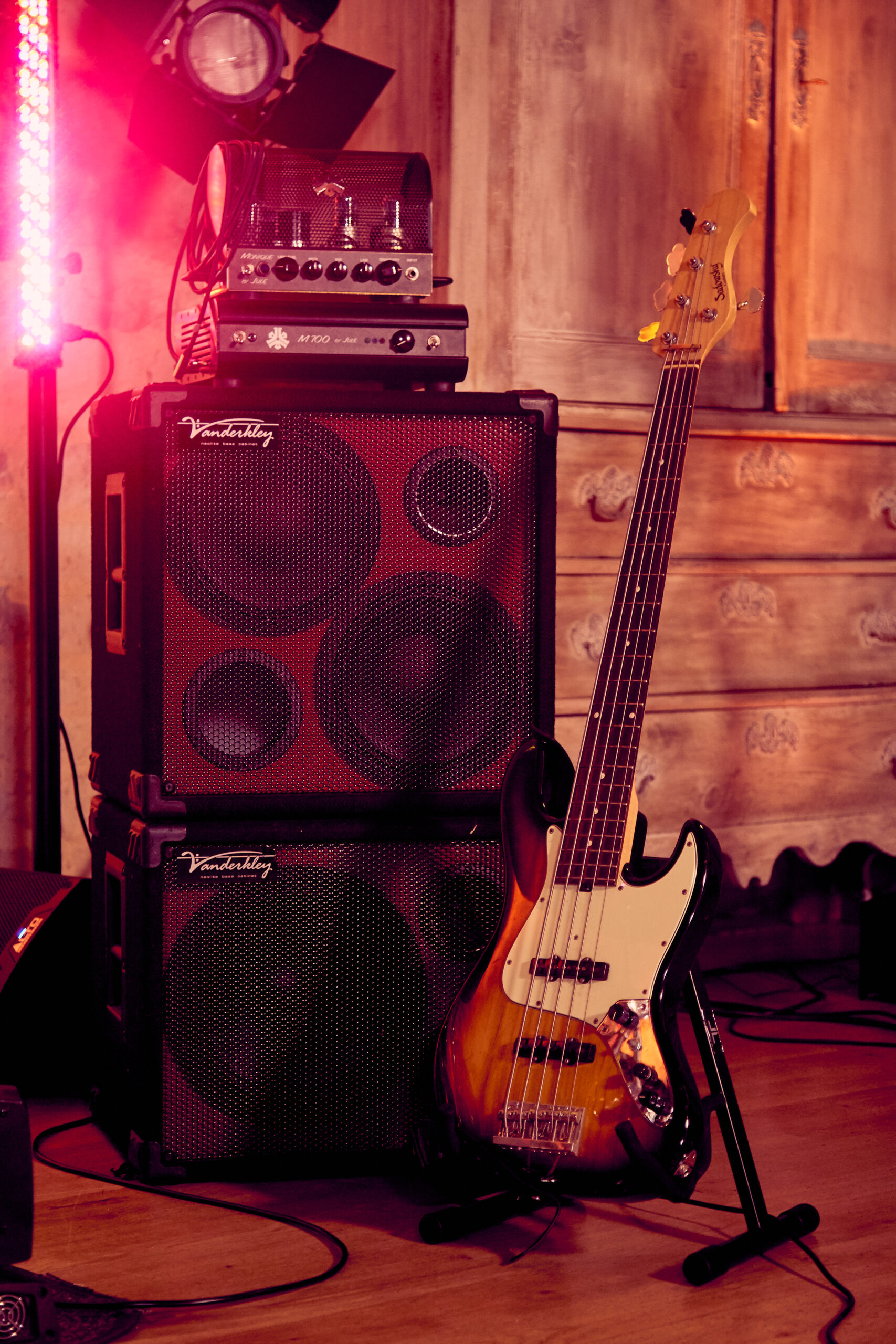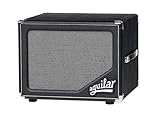Are you looking to upgrade your sound with a new bass guitar speaker cabinet? Whether you’re hitting the stage or plugging in for a studio session, having the right gear is essential. With so many options out there, it can be hard to decide which one is right for you.
In this article, we’ll provide an overview of the different types of bass cabinets available and offer tips on how to choose the best one for your needs. We’ll also talk about the enclosure materials used to construct these cabinets, as well as how much power they require from your amplifier head. By the end of this article, you should have all the information you need to find the perfect bass cabinet for your setup!
The most popular type of bass guitar cabinet is the 4×10″ box (sometimes referred to as a wedge) which provides plenty of low-end response. However, other sizes such as 2×12″, 1×18″, and 6×15″ are available depending on what kind of sound you’re after and how much space you have in your recording studio or live venue. You also need to take into account whether you’d prefer sealed or ported enclosures, as each has its own advantages when it comes to volume and tone quality.
In addition to size and type of enclosure, it’s important to consider what material is used for construction. Wood typically produces warmer tones than plastic does, but it isn’t always lightweight enough for use on stage. On the other hand, plastic can sometimes be too bright sounding but offers portability that wood just can’t match. We’ll discuss both materials in more detail later on in this article.
Finally, it’s important to consider how much power your amp head will require from a cabinet – too much power could cause clipping or damage your amp head while too little won’t give you enough output volume – so be sure to check before buying!
With all that said, let’s dive deeper into choosing the perfect bass guitar speaker cabinet!
Best Bass Guitar Speaker Cabinet: Our Top Picks
Whether you’re looking for a cheap bass cabinet, you’ve got a modest budget or the bank balance of a rock star, you’ll find something worth looking at in our top picks list below!
Every bass player will want different things from their bass cabinets.
Some will think that playing bass with two cabinets is a must, others will want smaller speaker sizes, and others will be happy with a combo amp like the Fender rumble.
Whether you want more power, more clarity, an older model or a practical feature like interlocking corners, it’s important to shop around, read reviews, look for deals and find a combination of bass amp head and bass cabinet that really work for you.
Yes, any bass amp you buy will likely come with it’s own brand of bass cabinets, but you don’t always have to go with them. Especially not because their sold together as a package or because the shop assistant has said you “must buy them”.
Instead, take your time to look around, speak to other bass players and try things for yourself.
You might like the better low end response of one cabinet that you’ve been told is bad. You might prefer the power handling of a model you’ve been told to ignore.
All of this is fine because it’s helping you build your own preferences and opinions.
However, if you’re really stuck and need a little help getting started on your search then take a look at our top picks for bass guitar cabinets.
Sealed and Ported Bass Guitar Cabinets
When it comes to choosing a bass guitar speaker cabinet, there are two primary options: sealed and ported. Understanding the differences between each type of speaker cabinet can help you make an informed decision about which is best for your music. Sealed cabinets are airtight enclosures that produce tight, punchy bass tones.
They tend to have less output than ported speaker cabinets, but they sound great on stage or in small recording spaces since the sound does not travel too far. Since sealed enclosures create less air movement, they require less processing power from your amp head and don’t require as much power to reproduce the same sound.
Ported cabinets, also known as bass reflex cabinets, feature a port—an opening in the speaker enclosure designed to allow more air movement—which increases low-end output and gives your tone a bit more thump. This extra output makes them louder than sealed cabinets and better suited for larger gigs or studio recordings where space isn’t an issue. It also requires more processing power from your amplifier head so it can keep up with the increased air movement.
How do I know what bass cabinet to get for my bass amp head?
The type of bass cabinet you need depends primarily on two things: how big your gig is and how much power your amplifier head can provide. If you’re playing smaller gigs or recording in a small studio space, then a sealed cabinet is often the way to go since it doesn’t require as much processing power from your amp head while still providing enough volume for those smaller venues.
For larger shows or ample studio recording spaces, then a ported cabinet will give you plenty of volume without sacrificing clarity or tone quality by pushing too hard against the limits of your amplifier head’s capabilities.
The Bass Cabinet Enclosure
Bass guitar speaker cabinets come in several different sizes depending on how many speakers you want inside yours and how loud you need it to be able to play. Most standard cabinets typically hold four 10-inch speakers or four 12-inch speakers, although there are some with up to eight 10-inch drivers if you need even more volume or want multiple tones in one enclosure (such as having both clean and distorted sounds).
The material used for the cabinet itself is also important since this affects its tonal characteristics. The most popular materials used for bass guitar speaker cabinets are wood (typically MDF) for its resonant qualities and plastic (ABS resin) for its lightweight portability without sacrificing durability. Both materials have strengths that make them great choices depending on what kind of music you’re playing; just be sure to pick one that fits within your budget!Are guitar and bass cabinets the same?
No, guitar and bass cabinets are not the same. While both types of cabinets have speakers to amplify sound, they each have specific characteristics that make them suited for different types of music. Guitar cabs typically have relatively thin walls which allow for brighter sounds, whereas bass cabs have thicker walls which dampen higher frequencies and emphasize low tones.
What speaker is used for bass?
A variety of speaker configurations are available when it comes to bass cabinets – the most common choice is 4×10″, although some players prefer 6×10″ or even 2×12″. Each configuration offers its own unique sound, so it’s always worth experimenting and trying out different setups to see which one works best for you.
However, if you can’t find something you like amongst the standard models that most shops sell, you can always look at getting a custom bass cabinet made.
A custom bass cab will cost you a lot more but you can be sure you’re really getting what you want.
Or you could split the difference and look at high end models such as the eden ex112 bass cabinet.
Which Is The Best Bass Cabinet?
The answer really depends on your individual needs and preferences; however some popular choices include Ampeg SVT (for classic rock tones), Orange OBC810 (for heavy metal fans) and Aguilar DB755 (for modern jazz styles).
Ultimately though, the best cabinet will depend on the type of music you want to play and how much power your amplifier is able to handle!
What speakers are best for bass?
When it comes to finding the perfect speaker for your bass guitar, there are several factors to consider. Firstly, you’ll want to look at the power handling of the speaker – generally, a higher-rated speaker is better suited to heavier styles like rock or metal.
Secondly, you’ll need to think about the frequency response – make sure it can go low enough when you’re playing heavy riffs. Lastly, you may want to look at whether it’s a ‘full range’ speaker or a dedicated subwoofer.
If you want something that really packs a solid punch then you should look at powered bass cabinets.
What is a bass cabinet?
A bass cabinet (or ‘bass cab’) is a box that houses one or more loudspeaker drivers and amplifiers designed specifically for playing bass guitar. Bass cabs tend to have thicker walls and tighter construction than other types of cabinets in order to better handle the low frequencies produced by bass guitars.
The most popular choices of bass cab are either closed-back or open-back designs – each type has its own unique sound, so it’s worth exploring both and deciding which one works best for your style of music.
Are bass cabinets full-range?
No, not necessarily – while some bass cabs are designed as full-range systems (meaning they include tweeters as well as mid and low drivers), others only feature speakers for lower frequencies.
If you’re looking for full-range capabilities then you’ll need to opt for an amplifier with built-in tweeters. Alternatively, you could buy separate woofers and tweeters separately and mount them into a single cabinet.
Do You Need an Amp For Ubass?
Yes – just like any other electric instrument, UBass requires amplification in order to be heard properly. However, since UBass produces lower frequencies than regular electric guitars, it’s important to choose an amp that’s specifically designed for this purpose so that those tones don’t get lost in the mix. A good quality UBass amp will ensure your sound is accurately projected and heard clearly by everyone else in the room!
What Is The Best Speaker For Bass Guitar?
The best speaker for bass guitar depends on several factors such as what style of music you’re playing and how much power your amp can handle; however some general rules apply: if you’re looking for maximum output then go with a high power 15″ speaker; if clarity is more important than volume then opt for an 8″ or 10″ model; and if deep lows are what you’re after then consider a dedicated subwoofer which will give extra thump at the bottom end of your sound spectrum! Ultimately though, it’s all down to personal preference!
What Are The Best 15 Inch Bass Guitar Speakers?
When choosing a 15-inch bass guitar speaker, there are several factors to consider. For example, you want to look for a speaker that can handle higher wattage as this will help ensure it is powerful enough for larger venues and outdoor shows.
Additionally, the speaker should have a good low-end extension so that the low frequencies of your bass can be heard properly. Some of the best 15-inch bass speakers on the market include the Celestion G12M Greenback, EVM15L Black Label, and Eminence Legend V128.
Does Speaker Size Matter For Bass?
Yes! Different sizes of speakers can make a big difference when it comes to producing sound, especially with bass instruments. Generally speaking, bigger speakers tend to handle more power and offer greater low-end extension than smaller models, making them well-suited to bass amps where a deep tone is desired.
However, size isn’t everything – be sure to read reviews or demo potential purchases in person before making any decisions about what size of speaker you need.
What Is The Best Bass Guitar Cabinet?
The best bass guitar cabinet is going to depend largely on your individual needs and preferences as a musician. That said, there are some key features you should look for such as: variety of sizes; Celestion or Eminence speakers; ported ports for improved airflow and resonance; adjustable mounting points; strong construction materials like birch plywood; an open back design for increased air circulation; removable shelves/grilles/backs; integrated caster wheels & multi-directional castors.
Can Guitar Cabs Be Used For Bass?
Yes – although you may get better results if you use cabs specifically designed for bass guitars rather than guitar cabinets. This is because the latter typically feature lower wattage and lack features such as large magnets (which help generate deeper tones). However, if portability and budget are important considerations then using guitar cabs could still be an option worth exploring.
Do Guitar Cabs Make a Difference?
When it comes to producing the best sound for your bass guitar, having the right speaker cabinet is essential. The cab is what amplifies your bass amp and helps to project the sound throughout the room. The size and type of cabinet you choose can have a huge effect on how your music sounds, so it’s important to carefully consider what kind of cab you need.
What Kind of Bass Cabinet Do I Need?
The type of bass cabinet you need will depend on a few factors. First, consider whether you’re using an amp with tubes or solid state technology – different cabs are better suited to each. You should also think about how much power you require from a cab (measured in watts), and how large of a listening area you need to fill with sound. Finally, think about tone – because different wood types emit different tones when amplified through the speakers.
How Big Of A Bass Cab Do I Need?
How big of a bass cab you need will largely depend on where you plan to perform or practice. If you’ll primarily be playing small gigs or jamming in your bedroom, then 1×12” or 2×10” speakers are going to provide enough power for most situations, whereas if you’re playing larger venues or outdoor shows then look for something larger like 4×12” cabinets. And don’t forget about portability – bigger cabs often weigh more and may be harder to transport around.
Do Amp Cabinets Make A Difference?
Yes! While the amp head itself determines a lot about your bass tone, choosing the right cabinet can make all the difference in terms of clarity and projection. Different sizes and types of cabinets will deliver different frequencies which allows for greater tonal control – so it pays to get familiar with the range of options available before making any decisions!
How Do I Choose A Bass Amp And Cabinet?
It can seem overwhelming when faced with so many options but there are some key things that can help guide your decision-making process when looking at amps and cabinets:
Consider your musical style – this will determine both whether an amp with tubes or solid-state technology is better suited; as well as combo versus separate head/cab configurations;
Decide on wattage requirements & size of listening area;
Research speaker sizes and types & their impact on tone;
Don’t forget about portability – especially useful if gigging frequently;
Consider features such as tweeters and design perks like interlocking corners;
Be sure to test out any potential purchases before buying – take advantage of any demo days offered by local stores etc., or plug in at friends houses!
Final thoughts
Choosing the perfect bass cabinet for your setup is an important decision, but with the right information and research, you can be sure that you’ll have great sound quality no matter where you go. To find the best option, start by deciding on the size of enclosure that will provide the sound and volume you need. Consider whether sealed or ported speakers are better for your needs and which material (wood or plastic) will give you the kind of tone you’re looking for. Finally, make sure to check how much power your amplifier requires from the cabinet and that it fits into your budget.
Once these details are sorted, all that’s left is to compare different models until you find one that meets your needs. Time spent researching now will save time and frustration later – not to mention money! After all, good bass cabinets can last a lifetime when cared for properly so it pays to do some homework before buying.
In conclusion, choosing a bass cabinet isn’t an easy task but with enough knowledge and research, finding the bass gear that you really want can be done quickly without sacrificing quality. Consider size, type of enclosure, materials used in construction and power requirements carefully before purchase to ensure that your new speaker cabinet meets all expectations in terms of sound quality, portability and durability. But don’t be afraid to follow your gut. If you think that the best 210 bass cabinet (for example) is a TC electronic bass cab instead of the Markbass everyone’s been talking about then so be it.
Good luck on finding the perfect bass guitar speaker cabinet!








Leave a Reply